How to Backup Outlook PST Files [2022 Complete Tutorial]
PAGE CONTENT:
This post will show you three available methods to Outlook backup PST files step-by-step.
What is Outlook PST File & Why You Need to Backup It
Outlook is one of the most popular email clients used by businesses and individuals worldwide. It is part of the Microsoft Office suite of products and is available for both Windows and Mac.
One of the key features of Outlook is its support for PST files. PST stands for Personal Storage Table, and Outlook PST file is a file that stores all of your Outlook data, including emails, contacts, calendar items, tasks, and notes.
This file is located on your computer's hard drive and is used by Microsoft Outlook to store all of your Outlook data in one place. PST files can also be used to transfer data from one Outlook installation to another.
There are a number of reasons why you might want to back up the Outlook PST files.
- If upgrading to a new computer, you will need to transfer your PST file to the new machine.
- When you migrate from an older version of Outlook to a newer one, you will need to export your PST file and then import it into the new version of Outlook.
- If your Outlook crashes or outlook data gets corrupt, you will need to restore your PST file from a backup.
Thus, having a backup of your Outlook PST file is an important part of using this email client. This article will show you three methods to back up outlook PST files.
How to Backup Outlook PST Files – 3 Methods
| Workable Solutions | Step-by-step Troubleshooting |
|---|---|
| Method 1. Use Outlook Backup Software |
Launch Qiling Backup on your computer, and click Cre...Full steps |
| Method 2. Use Personal Folder Backup | Launch Microsoft Outlook, and sign in with your account and...Full steps |
| Method 3. Use Import/Export Wizard | Open Microsoft Outlook and click File, and select Open & Export ..Full steps |
Method 1. Backup Outlook PST Automatically with Outlook Backup Software
Qiling Backup is a reliable and professional backup software that can help you backup outlook PST files with just a few clicks. This outlook backup software supports automatic and scheduled backup Outlook PST files and saves them to a USB flash drive, external hard drive , or network location.
Besides these, Qiling Backup can satisfy your various backup needs, like full backup, incremental backup, and differential backup.
Now, follow the outlook backup tutorial below to learn how to backup outlook PST files with Qiling Backup software step-by-step.
Step 1. Launch Qiling Backup on your computer, and click File Backup on the home screen.
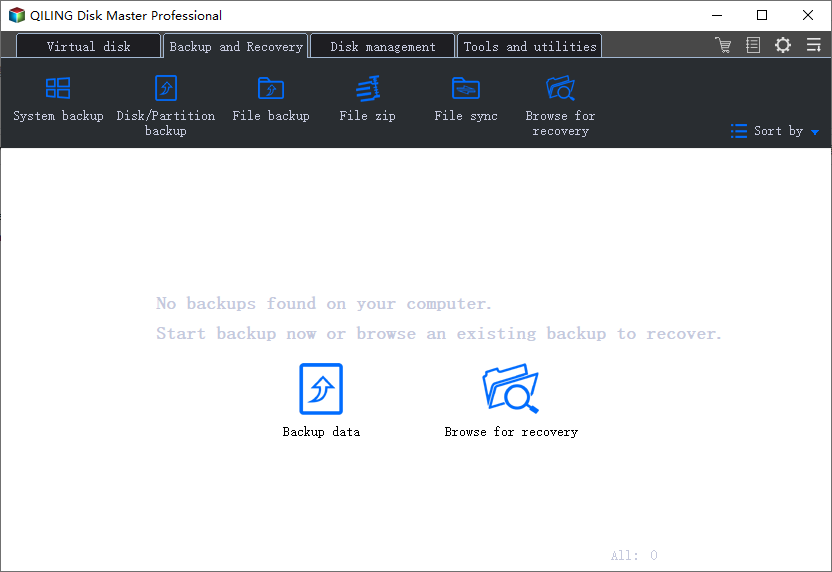
Step 2. Your Microsoft Outlook database folder will appear. Select the mailbox addresses you want to make a backup of the mails, contacts or calendars.
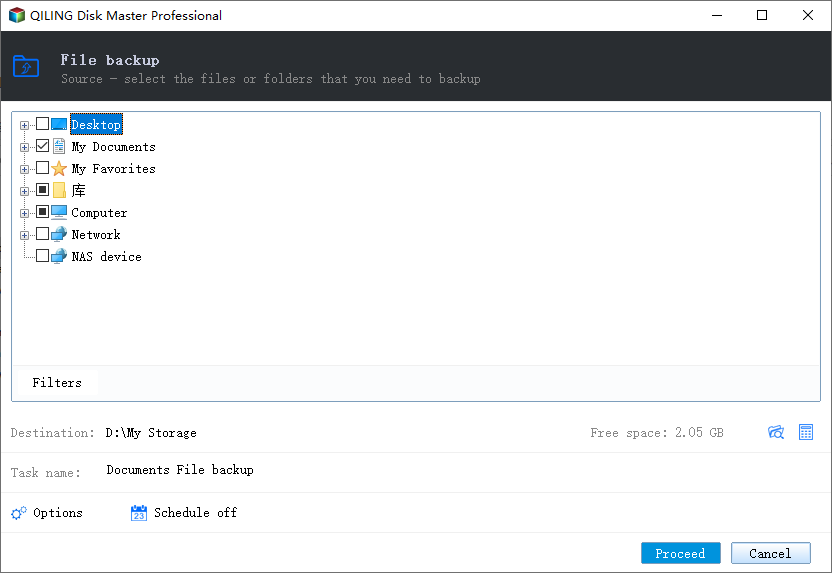
Step 3. Next, you'll need to choose a location to save the Outlook backup by clicking the illustrated area.
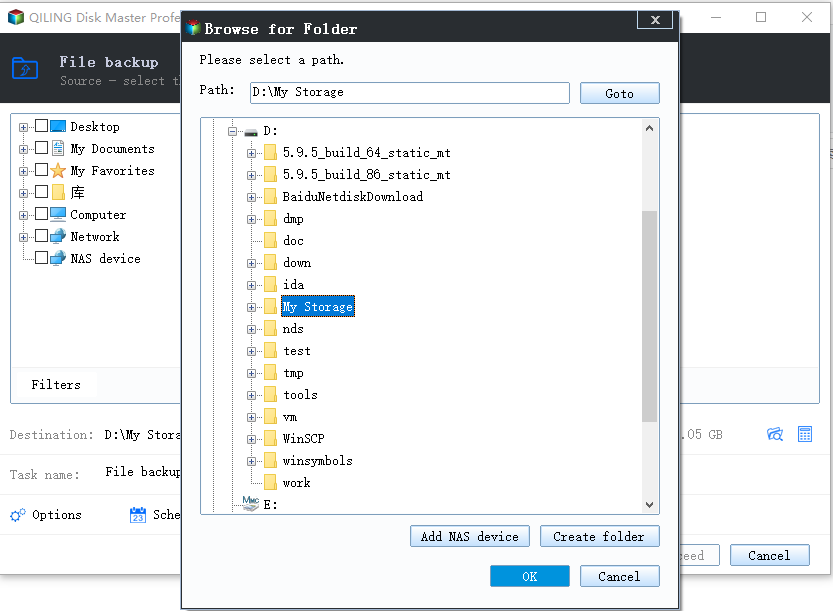
Step 4. The backup location can be another local drive on your computer, an external hard drive, network, cloud or NAS. Generally, we recommend you use an external physical drive or cloud to preserve the backup files.
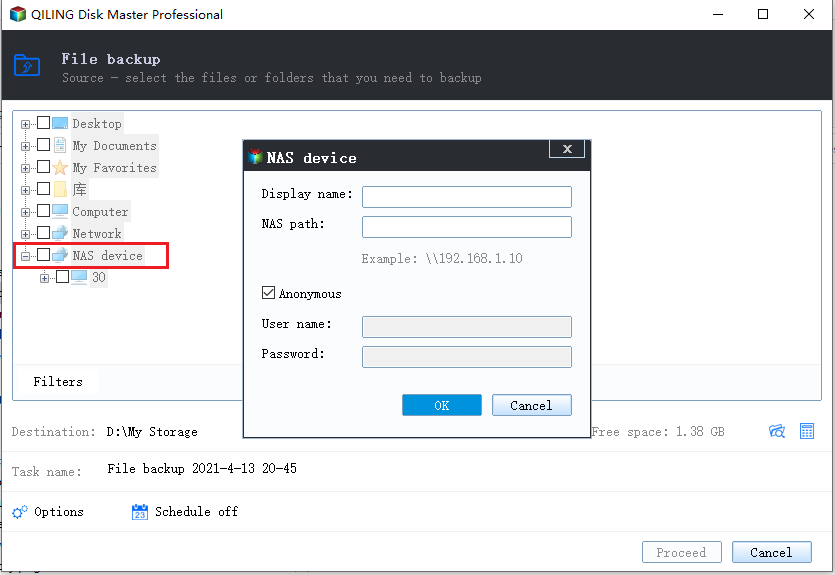
Step 5. Cusomiztion settings like setting an automatic backup schedule in daily, weekly, monthly, or upon an event, and making a differential and incremental backup are available in the Options button if you're interested. Click "Proceed", and the Outlook backup process will begin. The completed backup task will display on the left side in a card style.
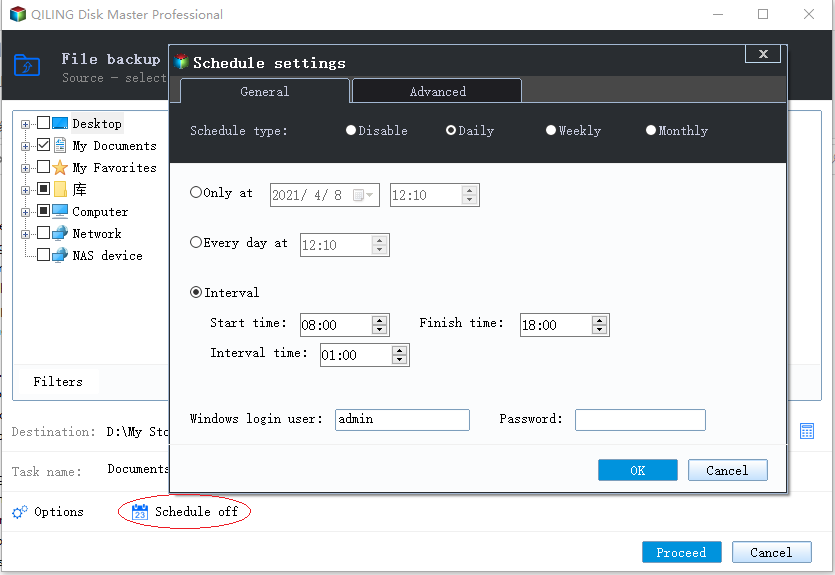
Method 2. Backup Outlook PST Automatically with Add-in Personal Folder Backup
Personal Folder Backup utility is an add-in feature that is installed on Microsoft Outlook to automate the backup process. It backs up Outlook only in PST formats.
If you are using an exchange server mailbox, it will back up your files frequently by the server administrator. The following are specific steps to use the Microsoft Outlook Personal Folders Backup tool add-in to backup Outlook PST files.
Step 1: Launch Microsoft Outlook, and sign in with your account and password.
Step 2: Click on the File tab in the top-left corner, then Select Backup.
Step 3: Click on Options. Then select the file that you want to back up in the pop-up window.
Step 4: Click Finish and your files will start backing up itself automatically.
Method 3. Backup Outlook PST Manually with Import/Export Wizard
The Export and Import feature is a manual outlook backup method. It can be used to back up Outlook PST files on your local computer or to transfer outlook data to another computer.
Here are the detailed steps to export outlook data to PST files:
Step 1: Open Microsoft Outlook and sign in with your account information.
Step 2: Click the File, and select Open & Export > Import/Export.
Step 3: In the pop-up window, select Export to a file option and click Next.
Step 4: Then select Outlook Data File (.pst) as the export type and click Next.
Step 5: Select the outlook data that you want to export and click Finish.
You can also use this method to transfer outlook data to another computer.
To do this, you need to first export outlook data from the old computer to PST files. Then copy these PST files to the new computer. Finally, import these PST files into outlook on the new machine.
Related Articles:
Final Verdict: A Comparison of Three Backup Methods
All of the three methods above can help you backup Outlook PST files. However, each method has its own advantages and disadvantages.
The first outlook backup method - backing up Outlook with outlook backup software- is the most recommended method since it is easy to use and can help you automate the outlook backup process. It also supports outlook incremental backup and outlook differential backup.
Backing up Outlook with Personal Folder Backup Utility is also easy to back up Outlook. However, it only supports outlook backup in PST format, and you need to have some knowledge about the Outlook Personal Folders Backup tool add-in.
Using the Import/Export feature to back up Outlook manually is a little bit complicated. But it supports outlook backup in PST and CSV formats and you can use it to transfer outlook data to another computer.
We recommend you try outlook backup software - Qiling Backup to automatically and securely backup Outlook PST files. You can download and try it now!
Backup Outlook PST FAQ
1. Where does Outlook backup PST files?
Different Outlook versions save backup PST files in the different default locations. As for the latest Outlook and Windows versions, you can find your PST file in the following path: C:\Users\AppData\Local\Microsoft\Outlook
2. How do I recover a PST file?
You can use the Import/Export feature in Outlook to recover a PST file. Choose Import from another program or file, then browse to the PST file, and choose a place to store the file.
3. Where is the Outlook PST file for Windows 10?
As for Outlook 2007 and older versions, you can find PST in the following location: C:\Users\\AppData\Local\Microsoft\Outlook. For Outlook 2010: C:\Users\\Documents\Outlook Files. For Outlook 2013, 2016, and 2019, follow the path: C:\Users\\AppData\Local\Microsoft\Outlook, or C:\Users\\Roaming\Local\Microsoft\Outlook
4. What is the difference between OST and PST?
Both OST and PST are data storage formats for Outlook. The PST files of Outlook are used to store archived items, while the OST files to maintain offline availability of the items. OST and PST can be converted into each other.
Related Articles
- How to Save Outlook Emails When Leaving Job | 2 Available Options
- Four Ways | How to Prevent Data Corruption in Windows Computer
- USB Bootable Software & Bootable USB Creation Tool
- How to Create Recovery Partition for Windows 7/8/10/11 with 2 Possible Ways